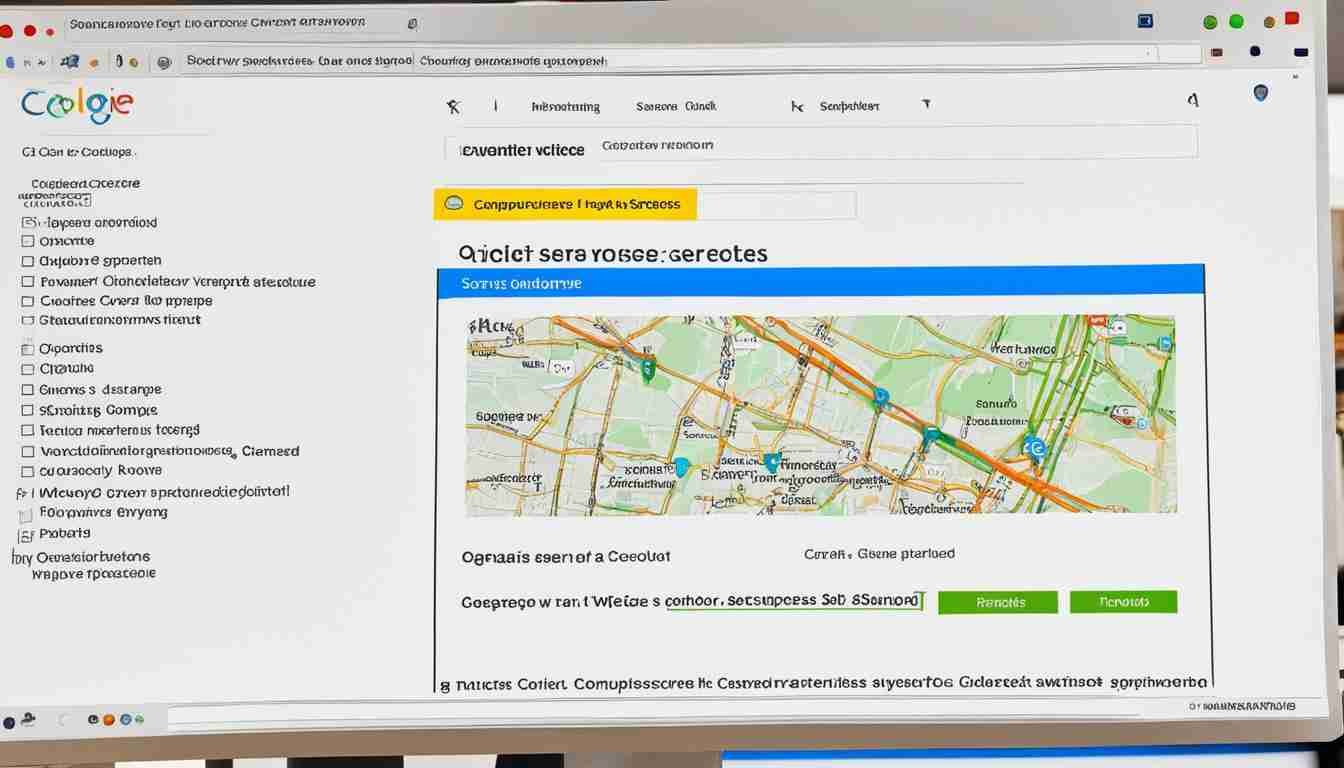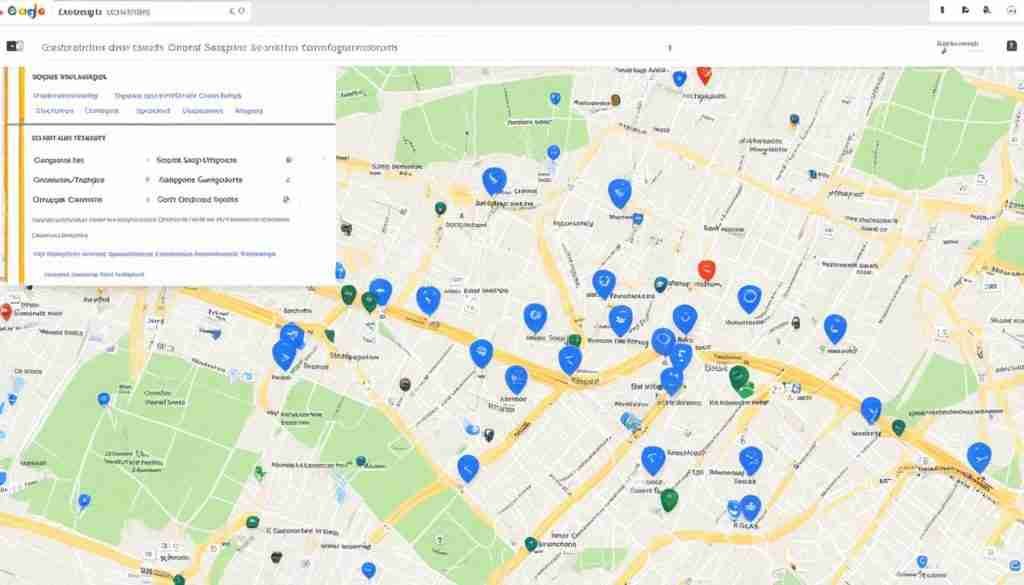Did you know over 80% of SEO experts started with DIY search engine optimization? As a business owner or marketer, you can take charge of your online presence. This guide from Ma Consulting Services (http://maconsultingservices.site/) will teach you to beat your competitors with proven SEO strategies.
If you’re new to SEO or want to improve your skills, this article has you covered. It covers publishing great content, optimizing site metadata, and technical aspects. With the right tools and tactics, you can increase your website’s rankings and bring in more visitors. These visitors can then become loyal customers.
Key Takeaways
- Researching keywords is key for DIY SEO. Use tools like Google Search, Google Keyword Planner, and FAQ Fox.
- Tools like Google Analytics 4, Google Search Console, and Google Tag Manager are vital for tracking website performance.
- Internal linking helps with website crawling and keeps users engaged. Backlinks can be earned through social media and email outreach.
- Do SEO audits every three months for the best results.
- Long-tail keywords draw in targeted traffic. Use tools like competitor sites, Google Search, and Google Keywords Planner for research.
Publish Relevant, Authoritative Content
Creating a strong online presence starts with making high-quality, authoritative content that speaks to your audience. For SEO, the quality and relevance of your content matter a lot. By making content that is truly useful and informative, you can draw more organic traffic and gain trust from search engines and readers.
Keywords
Choosing specific keyword phrases for each page on your site is key for better search engine rankings. Think about how your audience might look for your content and use those keywords naturally. Don’t overdo it with keyword stuffing; focus on creating content that’s easy to use.
Question keywords and long-tail keywords work well because they’re less competitive. Tools like the Semrush Keyword Magic Tool can help find these relevant, less competitive keywords.
Placing Keywords
After picking your keywords, put them in your page URLs, titles, headings, and content. This makes it clear to search engines how relevant your pages are. But keep it natural and easy to read.
Putting keywords in the right spots can boost your search engine rankings. But always put the user first and make sure your content is truly helpful and informative.
Content
It’s not just about URLs, titles, and headings. The content itself is key for search engine rankings. Make your content better by using your target keywords naturally, providing solid information, and linking to good sources.
Make your content easy to scan with bold, italics, and heading tags. Aim to create content that really helps and interests your audience.
Experience and Expertise
Using your own experiences and knowledge in your content can make it stand out. Showing your unique insights and perspectives builds credibility and connects with users. It also matches search engines’ goal of offering high-quality, relevant info.
As search engines get smarter, they value content written by real experts more. This means content from AI doesn’t rank as well.
SEO Formatting
Use bold, italics, heading tags, and other tags to highlight your keywords in a natural way. Never let SEO ruin your writing.
Adding schema.org markup gives search engines more info about your content. This can improve how your pages look in search results.

Update Your Content Regularly
Keeping your website’s content fresh and up-to-date is key for SEO. Search engines see updated content as a sign of a site’s relevance. So, make sure to check and update your pages regularly. This might mean adding new info, updating stats, or improving your content.
Blogging
Having an active blog and posting new blog posts regularly can help your search engine rankings. Make sure to interlink your blog posts with your main website pages. This helps readers find more information and makes their experience better. Recent data shows that bloggers who update their posts often are 2.8 times more likely to see better results.
Doing a thorough content audit and refresh can increase organic traffic by 106%. B2B SaaS companies spend about $3,000 a month on making new content. This shows how important it is to keep updating and refreshing your content.
To keep your website’s content interesting and relevant, try these strategies:
- Update statistics and data in blog posts to keep them relevant.
- Add new research studies to increase credibility and trust.
- Upgrade photos or videos to make your content more engaging.
- Use expert quotes to make your content more authoritative.
- Do keyword research for better SEO optimization.
- Add a call to action to increase user engagement and leads.
- Fix and update broken links to keep your website quality high.
- Build internal linking for better content structure and navigation.
- Consolidate content to avoid keyword cannibalization and improve ranking.
- Refresh meta descriptions for better click-through rates.
The top three results on Google get more than half (54.4%) of all clicks. So, updating and optimizing your content for search engines is key to driving traffic and improving your online presence.
| Metric | Value |
|---|---|
| Increase in Organic Traffic from Content Audit and Refresh | 106% |
| Bloggers More Likely to See Better Results from Updating Posts | 2.8x |
| Average Monthly Spend on Content Creation by B2B SaaS Companies | $3,000 |
| Share of Clicks Received by Top 3 Google Search Results | 54.4% |
how to do your own seo optimization
Search engine optimization (SEO) is key for a successful online presence. It might seem hard, but you can do it yourself. Here are steps to make your website better for search engines.
Metadata
Every page on your site has metadata, or info about the page, in the <head> section. The title metadata is crucial and affects how your page shows up in search results. Make sure to check and update it as your site changes.
Title Metadata
The title metadata is what shows as the page title in the browser and in search results. If you use a CMS, the title is often set automatically. But, use keyword-rich titles to help your site rank better.
Description Metadata
Description metadata gives a quick summary of your page. Keyword metadata is less used by search engines but still useful for context.
Keyword Metadata
Keyword metadata isn’t directly used by search engines for rankings. But, it’s good to include keywords here. Aim for 3-7 phrases, each with 1-4 words.
Use Alt Tags
Always add alt tags, or text descriptions, to images and videos. This helps search engines understand your content and makes your site more accessible for everyone.
Use Schema.org Markup
Adding Schema.org markup to your pages gives search engines more info about your content. This can affect how your site appears in search results. It’s great for showing publication and update dates.

By focusing on these DIY SEO steps, you can boost your website’s visibility in search engines. This will help drive more relevant traffic to your site.
Conclusion
Improving your website for search engines is a continuous task. It needs a full approach. Focus on creating top-quality content, making your site’s technical parts better, and using proven seo optimization methods. This will boost your site’s visibility in search results and bring more relevant visitors.
If you run a small business or are a seasoned marketer, this guide’s tips will help you boost your online presence. You’ll beat your competitors in search engine rankings. Always check your SEO performance and update as needed to keep your site doing well in the changing digital world.
With a strong content strategy, better technical seo setup, and using local and mobile-friendly methods, you can build a solid online presence. Keep focused, be ready to change, and adapt to seo optimization changes for long-term success online.
FAQ
What are some key strategies for conducting keyword research?
Start by finding specific keyword phrases for each page on your site. Think about how your audience might search for your content. Use tools like the Semrush Keyword Magic Tool to find relevant, low-competition keywords.
How can I effectively place keywords on my web pages?
Put your target keywords in page URLs, titles, headings, and content. This makes your pages more relevant to search engines. But, keep your writing natural and easy to read. Don’t overdo it.
What are the best practices for creating high-quality, optimized content?
Optimize your content by using your target keywords naturally. Provide authoritative information and link to relevant sources. Make your content easy to scan with bold, italics, and headings.
How can I leverage my own experiences and expertise to create compelling content?
Use your unique knowledge and perspectives to build credibility and engage users. Search engines value content from real experts more than generic or AI-generated content.
What are some tips for optimizing the metadata on my website?
Title metadata is key, so make it accurate and concise. Description metadata should summarize your page’s content. Keyword metadata adds context but doesn’t directly affect rankings.
How can I use alt tags and schema.org markup to improve my website’s performance?
Good alt text helps your pages rank better in image searches. Search engines use it to understand your images. Schema.org markup gives search engines more context about your content, improving how it shows up in results and crawling rates.
Source Links
- Can You Do SEO Yourself? Yes! Learn DIY SEO Now – https://www.webfx.com/blog/seo/can-you-do-seo-yourself/
- BruceClay – Search Engine Optimization – How-to Do SEO Guide – Effective Strategies for Improving Website Rankings with SEO – https://www.bruceclay.com/seo/search-engine-optimization/
- DIY SEO: A Basic 5-Step Guide That Anyone Can Follow – https://ahrefs.com/blog/diy-seo/
- Five Ways to Improve Your Site’s Ranking (SEO) | Michigan Tech – https://www.mtu.edu/umc/services/websites/seo/
- How to do Content Optimization + 14 Pro Tips [Checklist Included] – https://hawksem.com/blog/content-optimization/
- M javed on LinkedIn: Guide 1 . Publish Relevant, Authoritative Content Quality, authoritative… – https://www.linkedin.com/posts/m-javed-1b0291281_guide-1-publish-relevant-authoritative-activity-7111981071570731008-QVyC
- Update Your Sites SEO – https://www.webfx.com/seo/learn/update-your-sites-seo/
- 10 Ways to Refresh Your Content for SEO Optimization – BlogPaws – https://blogpaws.com/10-ways-to-refresh-your-content-for-seo-optimization/
- Content Refreshes: How to Update a page for SEO | Letterdrop – https://letterdrop.com/blog/how-to-update-a-page-for-seo
- SEO Starter Guide: The Basics | Google Search Central | Documentation | Google for Developers – https://developers.google.com/search/docs/fundamentals/seo-starter-guide
- DIY SEO: 6 Steps Anyone Can Follow to Get Results – https://www.semrush.com/blog/diy-seo/
- 10 Do-it-yourself SEO Tips to Save Money – https://www.practicalecommerce.com/10-do-it-yourself-seo-tips-to-save-money
- How to write an SEO-friendly conclusion – https://yoast.com/seo-friendly-conclusion/
- DIY SEO for Beginners: Mastering Your Own Online Presence Optimization – https://sonary.com/content/a-beginners-guide-to-doing-seo-yourself/
- How to Do SEO Yourself: Step-By-Step Guide – https://www.linkedin.com/pulse/how-do-seo-yourself-step-by-step-guide-qbric







